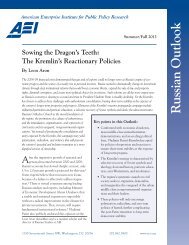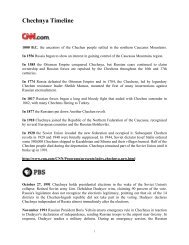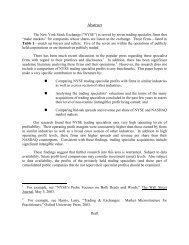Download the PDF - American Enterprise Institute
Download the PDF - American Enterprise Institute
Download the PDF - American Enterprise Institute
Create successful ePaper yourself
Turn your PDF publications into a flip-book with our unique Google optimized e-Paper software.
6 SLAVERY AND THE CONSTITUTIONAL CONVENTION<br />
of <strong>the</strong> debates between <strong>the</strong>se different groups, but a brief summary<br />
will be useful. Two main issues separate <strong>the</strong>se two groups. One is:<br />
how favorable was <strong>the</strong> Constitution produced in 1787 to slavery?<br />
The second is: what were <strong>the</strong> motives upon which <strong>the</strong> Founding<br />
generation acted when <strong>the</strong>y acted with regard to slavery?<br />
Now <strong>the</strong> Neo-Garrisonians answer <strong>the</strong> first question by saying that<br />
<strong>the</strong> Constitution was very favorable to <strong>the</strong> institution of slavery—<br />
that <strong>the</strong> Constitution gave slavery a great deal of life-sustaining aid,<br />
including recognition of its moral legitimacy. To <strong>the</strong>m, <strong>the</strong> Constitution<br />
was indeed an immoral compromise.<br />
The Neo-Lincolnians, while conceding that <strong>the</strong> Constitution did<br />
indeed contain some accommodations to <strong>the</strong> institution of slavery,<br />
deny that <strong>the</strong>se were nearly as substantial as <strong>the</strong> Neo-Garrisonians<br />
claim. And <strong>the</strong>y particularly deny that <strong>the</strong> Constitution stamped <strong>the</strong><br />
institution with some kind of recognition of its moral legitimacy.<br />
The Neo-Garrisonians answer <strong>the</strong> second question about <strong>the</strong><br />
motives behind <strong>the</strong> actions of <strong>the</strong> Founders by saying that <strong>the</strong>y were<br />
moved by <strong>the</strong> same complex of motives that led to <strong>the</strong> establishment<br />
and thriving of slavery in <strong>the</strong> first place: greed, racism, Christian<br />
triumphalism, and moral indifference.<br />
The Neo-Lincolnians, on <strong>the</strong> o<strong>the</strong>r hand, emphasize <strong>the</strong> place of<br />
slavery in <strong>the</strong> constitutional order as due primarily to <strong>the</strong> press of<br />
necessity: <strong>the</strong>y argue that without <strong>the</strong>se concessions to slavery, <strong>the</strong><br />
Union could not have been made, and so to <strong>the</strong>m <strong>the</strong> Constitution<br />
was a moral, or at least a necessary, compromise. The Neo-Lincolnians<br />
frequently point in this connection to <strong>the</strong> expectation—or <strong>the</strong><br />
hope, anyway—among many of <strong>the</strong> Founders that <strong>the</strong> process of<br />
abolition begun in <strong>the</strong> states during and just after <strong>the</strong> <strong>American</strong><br />
Revolution would continue until slavery had been removed from<br />
<strong>the</strong> land.<br />
The scholarly debates on <strong>the</strong> place of slavery in <strong>the</strong> Constitution<br />
can be very heated. The topic is indeed so controversial that <strong>the</strong> parties<br />
cannot even agree on how many parts of <strong>the</strong> Constitution are<br />
relevant to slavery. One Neo-Garrisonian that I know found in <strong>the</strong><br />
Constitution 18 clauses directly or indirectly supportive of slavery.<br />
The Neo-Lincolnians find far fewer (only three): <strong>the</strong> three-fifths






